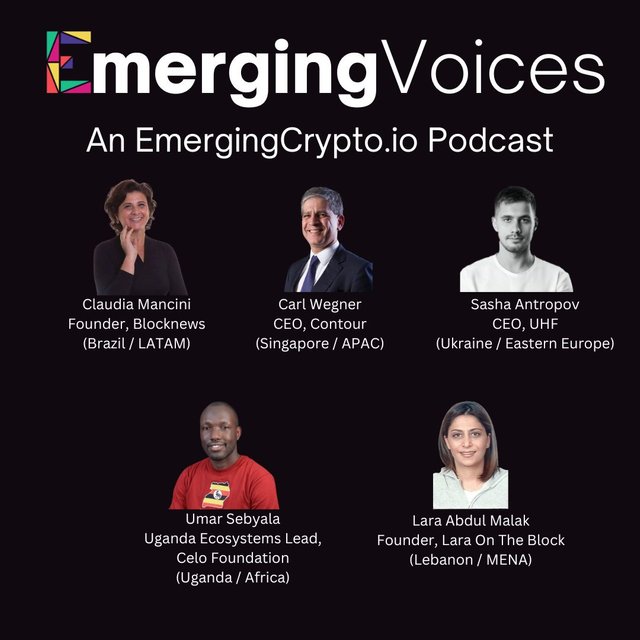
This is the EmergingCrypto.io weekly update. Want to receive this weekly in your email inbox? Then tap here to sign up
EmergingCrypto.io is the🌍's only weekly newspaper dedicated to web3 news from emerging markets. 🤖Connect with us across the web here👉https://linktr.ee/emergingcrypto.io
In This Issue
Latin America and The Caribbean
🔸Blockchain Considered as a Solution to Combat Illegal Gold Mining
🔸Freelancers in Latin America Increasingly Prefer to Be Paid in Bitcoin
Africa
🔸Two African Projects Win Human Rights Foundation Bitcoin Grant
🔸Due to Dismal Adoption, Nigeria Seeks New Partner for CBDC Tech Revamp
Asia
🔸Hong Kong Forms Task Force To Seize Web3 'Golden Opportunity'
🔸Bank of Israel Proposes New Regulation for Stablecoins, Algorithmic Stablecoins to Be Prohibited
Eastern Europe
🔸Russian Founders of DeFi Platform Charged with Running a Global Ponzi Scheme
🔸Experts Skeptical of Russia's Digital Financial Asset Trials
Clips from Season 1 of EmergingVoices are now on YouTube!

Latin America and The Caribbean

Image Credit: Jingming Pan via Unsplash
Blockchain Considered as a Solution to Combat Illegal Gold Mining (3 minute read, Portuguese)
To combat illegal gold mining on indigenous lands in the Amazon, a bill has been introduced in the Brazilian legislature to establish a blockchain-based tracking system for all gold mined and extracted in Brazil. Illegal gold mining has negatively impacted the production and commercialization of Brazilian gold on the international market after reports of children dying of malnutrition and other diseases caused by illegal gold mining in the Yanomami territory, the country's largest indigenous reservation bordering Venezuela. The purchase and sale of gold in Brazil takes place in a gray area of the market, where there is no proof of origin and traceability, which raises concerns about the industry’s reputation.
Freelancers in Latin America Increasingly Prefer to Be Paid in Bitcoin (2 minute read, Spanish)
Remote workers and freelancers in Latin America are increasingly opting for cryptocurrency as a form of payment, with 64% of workers in the region choosing to receive their salary in bitcoin. This rise in cryptocurrency payments occurred despite the fall in the market, with the economic crisis and inflation in the region prompting workers to protect their income with bitcoin. Argentine workers are reported to have the highest preference to be paid in bitcoin.
Want more Latin America and Caribbean news?
•Ripio launches multi-chain Web3 wallet; cryptocurrency course at B3 and PicPay tests investment offer (Portuguese)
•Upland launches São Paulo city into the metaverse (Portuguese)
•Bitcoin exchanges are taken by surprise and are still studying how to act with new Central Bank rules that affect the PIX (Portuguese)
•Agro is verse, agro is block: metaverse, blockchain and urban plantations are the focus for the future of agriculture in Brazil (Portuguese)
•B3 and QR Asset launch a 100% free online course on crypto assets (Portuguese)
Africa

Image Credit: Human Rights Foundation
Two African Projects Win Human Rights Foundation Bitcoin Grant (2 minute read)
Qala, a fellowship program for training the next generation of African Bitcoin and Lightning developers, and the Africa Bitcoin Conference, the leading conference in Africa that focuses on Bitcoin, each have been awarded a grant from the Human Rights Foundation's (HRF) Bitcoin Development Fund. Qala and the African Bitcoin Conference received $100K and $75K in bitcoin respectively. Since 2020, the HRF has provided over $2.2mm in both BTC and USD to support more than 70 developers, educators, and open-source initiatives around the world.
Due to Dismal Adoption, Nigeria Seeks New Partner for CBDC Tech Revamp (2 minute read)
The Central Bank of Nigeria (CBN) is in talks with potential technology partners to develop a new system to maintain full control of the technology behind its central bank digital currency, the e-Naira. One person familiar with the matter said the CBN is in discussion with New York-based firm, R3. With a population of over 200 million in Nigeria, adoption of the e-Naira has been dismal, with only around one million downloads of digital wallets as of October 2022.
Want more Africa news?
•The Central Bank of Rwanda Issues Public Notice Warning Against Cryptocurrencies Including Stablecoins
•Bank of Zambia and SEC Zambia Currently Looking at Crypto Regulation, Says Technology Minister
•The Senate of Kenya Resolves to Engage the Central Bank of Kenya on Crypto Policy
•Crypto adoption growth demands for improved infrastructure in Africa
•Opportunities and Challenges of Cryptocurrency Adoption in Seychelles
Asia

Image Credit: Daniam Chou via Unsplash
Hong Kong Forms Task Force To Seize Web3 'Golden Opportunity' (2 minute read)
Hong Kong's Financial Secretary, Paul Chan, has announced the creation of a task force on virtual asset development to bring together policymakers, regulators, and crypto industry players to develop sustainable and responsible growth for the sector to seize the "golden opportunity" that web3 poses. Chan's budget speech also allocated HKD50mm ($6.37mm) to support the Web3 hub at Hong Kong’s creative digital community, Cyberport. The move follows the Securities and Futures Commission's proposal to allow all types of investors access to virtual asset trading platforms, subject to various conditions.
The Bank of Israel has published a consultation paper on the regulation of stablecoins in the country. The proposals suggest that algorithmic stablecoins will not be allowed and issuers may be allowed to have some central bank deposits as part of the stablecoin reserves. The proposals also include the need for issuers to be licensed, stablecoins to be 100% collateralized, reserve assets to be held in short-term government bonds and Bank of Israel deposits, and customers to have direct rights to collateral in the event of insolvency.
Want more Asia news?
•Gemini co-founder: Crypto’s next bull run will start in Asia
•Hong Kong’s Crypto Hub Ambitions Win Quiet Backing From Beijing
•Head of BIS envisions unified ledger for CBDC, tokenized deposits, digital assets
•Former Binance Exec to Gather $100M to Accelerate Crypto Adoption in UAE
•Tencent to Offer Metaverse-Building Services for Asian Markets
Eastern Europe

Image Credit: sebastiaan-stam via Unsplash
Russian Founders of DeFi Platform Charged with Running a Global Ponzi Scheme (2 minute read)
Four Russian citizens have been charged with operating a cryptocurrency pyramid and Ponzi scheme through the decentralized finance platform, Forsage, which allegedly defrauded investors of around $340 million. The defendants, who promoted the project as a legitimate, low-risk business opportunity through its website and social media, are each charged with conspiracy to commit wire fraud, and face up to 20 years in prison if convicted. Blockchain forensics showed that over 80% of Forsage investors received fewer ether back than they had invested, and at least one smart contract was used to divert investors’ money to cryptocurrency accounts controlled by the founders.
Experts Skeptical of Russia's Digital Financial Asset Trials (4 minute read, Russian)
Alfa-Bank has conducted a trial issue of digital financial assets (DFA) worth RUB 10 million, secured only by monetary rights, making it the first banking DFA of its kind. While other market participants are also planning new issues, experts remain skeptical about the segment, calling it an unsuccessful experiment that will never attract enough players due to unresolved issues surrounding taxation, liquidity, and infrastructure. Trading volumes in the DFA market are still minimal, and the segment is considered a tool for a very closed circle of people.
Want more Eastern Europe news?
•Ingosstrakh: the digital ruble will make insurance payments instant (Russian)
•The bill on the legalization of mining will be submitted to the State Duma (Russian)
•Vinnik's lawyer allowed the possibility of his exchange (Russian)
•Millions in crypto donations pour for Turkey and Syria earthquake relief
•A resident of Belarus lost $70,000 in an attempt to cash out cryptocurrency (Russian)
Thanks for reading and have a great week ahead!
What did you think of today's newspaper?
Awesome I Great I Good I Okay I Bad
If you have any comments or feedback, leave a comment below!
Want to receive this weekly in your email inbox? Then tap here to sign up
Written by Jon Lira, Founder of EmergingCrypto.io. Connect with him on LinkedIn.
🤖Connect with us across the web here👉https://linktr.ee/emergingcrypto.io
Finally! There is a great way you can work online from your home using your computer and earn at the same time... Only basic internet knowledge is needed and a fast internet connection... Earn as much as $3000 a week...Get more details on the following site...https://prizebest01.blogspot.com/
Downvoting a post can decrease pending rewards and make it less visible. Common reasons:
Submit